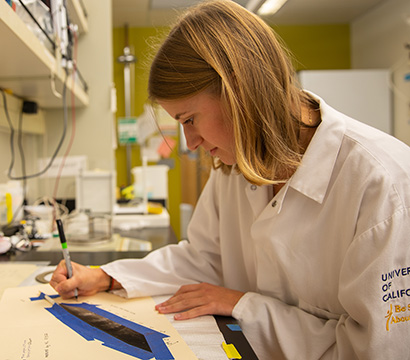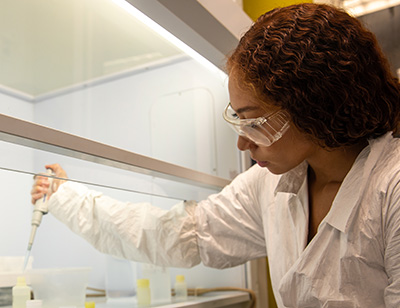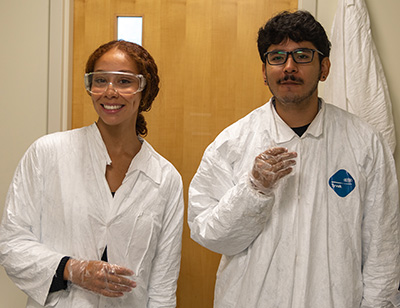Campus News
Student researchers investigate toxic lead exposure in golden eagles
A gift from the Webster Foundation to UCSC’s Predatory Bird Research Group supports student interns helping to study lead poisoning in eagles and monitor peregrine falcons.




Undergraduate researchers in environmental toxicologist Myra Finkelstein’s lab at UC Santa Cruz are investigating the impacts of lead exposure on eagle populations through a partnership with UCSC’s Predatory Bird Research Group, with support from the Helen and Will Webster Foundation.
Finkelstein, an adjunct professor in the Department of Microbiology and Environmental Toxicology, has done pioneering research on lead poisoning in California condors, establishing a body of scientific evidence that helped inform California’s ban on the use of lead ammunition in hunting. Condors, eagles, and other species are poisoned by ingesting bullet fragments when they feed on the remains of animals shot with lead-based ammunition.
Finkelstein began investigating the impacts of lead exposure on eagles several years ago, but funding for this research has been hard to come by.
“We know eagles are dying from lead poisoning, but we don’t have enough data to tell what effect this is having on their populations, which is important for informing management and policy decisions,” she said.
For the current project, she teamed up with Zeka Glucs, a former graduate student in her lab who now directs the Predatory Bird Research Group (PBRG), to launch their first formal collaboration. The Webster Foundation’s gift provides funding for student interns to work with Finkelstein on the eagle project and help Glucs expand the PBRG’s peregrine falcon monitoring program.
“We have a long-standing program to monitor the peregrine falcon population throughout the Bay Area using nest cams and bird banding,” Glucs said. “This collaboration with Myra’s lab is a great and rare opportunity for students to get hands-on experience in both lab research and field research.”
The students will begin field research with Glucs next year. In the lab, they are just getting started on the analysis of feathers and blood samples collected from golden eagles in Montana by the Teton Raptor Center.
“We have blood samples and feathers from about 40 birds that will provide a unique data set for understanding lead exposure rates in golden eagles,” Finkelstein said. “I’m really excited, because we’ve had this project ready to go, we just needed the support to work on it.”
She currently has six students working in her lab, including five supported by the Webster Foundation gift. Having the funds to pay student interns enables many more students to get valuable research experience, she said.
“It allows us to bring in students who wouldn’t otherwise be able to do it,” she said. “Zeka and I feel strongly that it shouldn’t be just those who have the luxury to volunteer who get this career-building experience. Having the funds to support students doing lab and field-based research is important to create equal opportunities for all our undergrads at UCSC.”
The student researchers will get to present their findings at a scientific symposium, and Finkelstein said she hopes they will eventually be coauthors of a peer-reviewed publication based on their results.